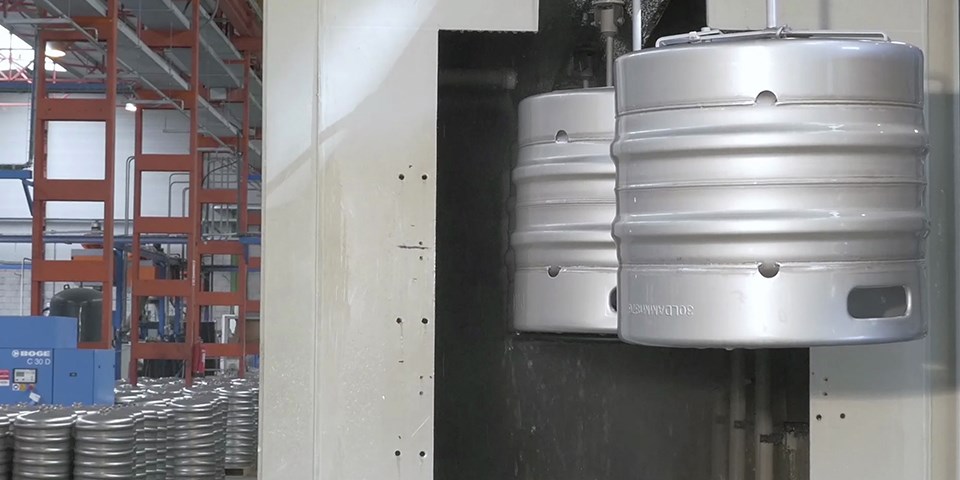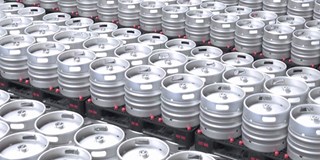Pic 1. Kegs leaving tunnel after pickling with nitric-acid-free Bonderite C-CP1300 (Photo: Entinox)
Text by Henkel
Text by Henkel
___
The challenge in pickling solutions for stainless steel lies in removing all scale, iron contamination and welding oxides to achieve a fully passivated surface with an even, clean and aesthetic finish. In the food industry and for key products such as beer kegs, the surface must also be absolutely free from any traces of pickling agents after the process. In addition, manufacturers face increasingly strict health, safety and environmental (HSE) regulations with regards to the release of potentially harmful substances, such as NOx emissions in air and nitrate effluents in water.
“In our state-of-the-art keg plant at Zaragoza, we decided to implement Henkel’s Bonderite C-CP 1300 pickling and passivating process because of its combination of high productivity and uncompromising sustainability,” states José Enrique Gerona, General Manager of Entinox. “Moreover, Henkel’s experts were instrumental in helping us set up and optimize the process.”
Nitric acid-free pickling
Bonderite C-CP 1300 is the latest of several nitric acid-free cleaning technologies originally developed several years ago. In contrast to common mixed acid pickling systems, which are still used in many stainless steel segments today, it contains no HNO3 (nitric acid), while delivering excellent pickling and passivating results. Furthermore, its absence of citric compounds also addresses the growing concern among beer brewers about residual flavours in the barrels.
“Our Bonderite C-CP 1300 process was developed with a clear target to eliminate the risks associated with HNO3 in traditional mixed acid pickling systems,” explains Ronald Elemans, Business Development Manager for Cleaners at Henkel. “Nitrogen oxide emissions from these systems can entail significant neutralization costs, and there is practically no feasible way of removing nitrate effluents in wastewater. Both factors also limit the possibility of increasing the productivity of the pickling process without heavy investments for NOx and NO3 ion removal.”
The process can be used in spraying or immersion lines and is suitable for almost any stainless steel grades based on austenite, ferrite, martensite or duplex, including high-chromium AISI/SAE 4XX qualities. The system includes a starter (ST) for bath make-up, two components (R & Z) to maintain the acidity of the bath as well as the oxidizing and passivating capacity of the pickling solution, and an optional accelerator (TO) for use in tough to pickle materials or in applications with limited contact times.
The process can be used in spraying or immersion lines and is suitable for almost any stainless steel grades based on austenite, ferrite, martensite or duplex, including high-chromium AISI/SAE 4XX qualities. The system includes a starter (ST) for bath make-up, two components (R & Z) to maintain the acidity of the bath as well as the oxidizing and passivating capacity of the pickling solution, and an optional accelerator (TO) for use in tough to pickle materials or in applications with limited contact times.
304L kegs
Entinox’s kegs are normally made from 1.4307 (AISI 304L) grade stainless steel sheet, one of the most widely used austenitic chromium-nickel steel alloys. After bending, forming and welding, each keg has a surface of 2 square meters. Prior to pickling, the barrels are cleaned and degreased in a spray washer. The Bonderite C-CP 1300 R and Z mix is then applied in another spraying step. The manufacturer’s new Zaragoza plant has a production capacity for up to 450,000 barrels per year and offers kegs in standard sizes of 20 to 50 liters as well as 7.75 and 15.5 U.S. gallons, including various customized options.
“The pickling quality and efficiency that we achieve with the process is outstanding,” comments Angel Roche, Technical Manager for Entinox.
“While the resulting corrosion resistance is on par with that provided by mixed nitric acid-based systems, Bonderite C-CP 1300 provides a significantly longer bath life. Moreover, as a more environmentally friendly nitric acid-free solution, it also eliminates the risk of nitric fumes within the production area. And the absence of hexavalent chromium means that all effluents can be treated in our existing wastewater plant.”
Apart from kegs for transportation of beer to bars and restaurants, Bonderite C-CP 1300 has a wide potential for leveraging similar cost and environmental benefits in many other markets where stainless steel is processed. Examples span from heat exchangers and chemical process equipment to stainless steel devices and machines in the food and beverages industry as well as in the pharma and semiconductor segments.
About Henkel
Founded in 1876, Henkel operates globally with three business units in both industrial and consumer businesses. In 2018 the company reported sales of 20 billion euros and employs more than 53,000 people globally. As a recognized leader in sustainability, Henkel holds top positions in many international indices and rankings. For information visit www.henkel.com.



